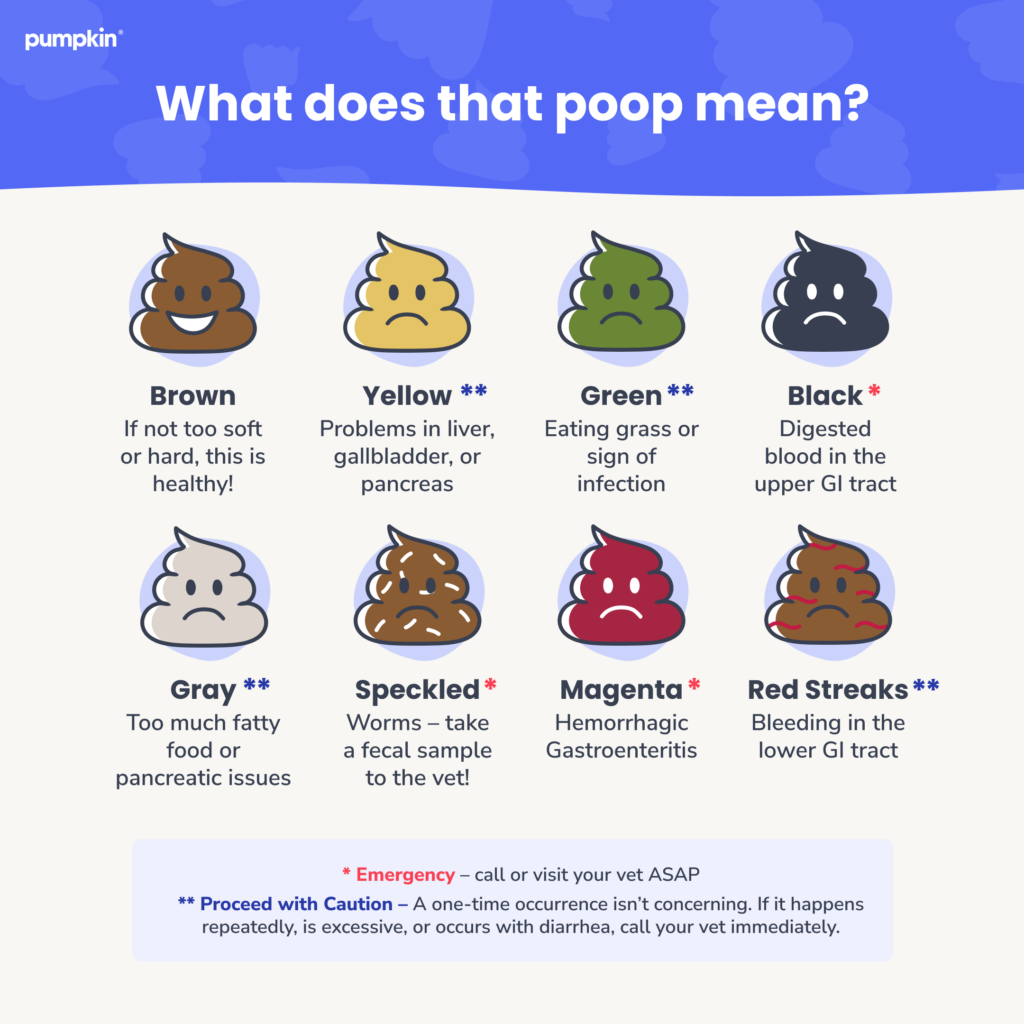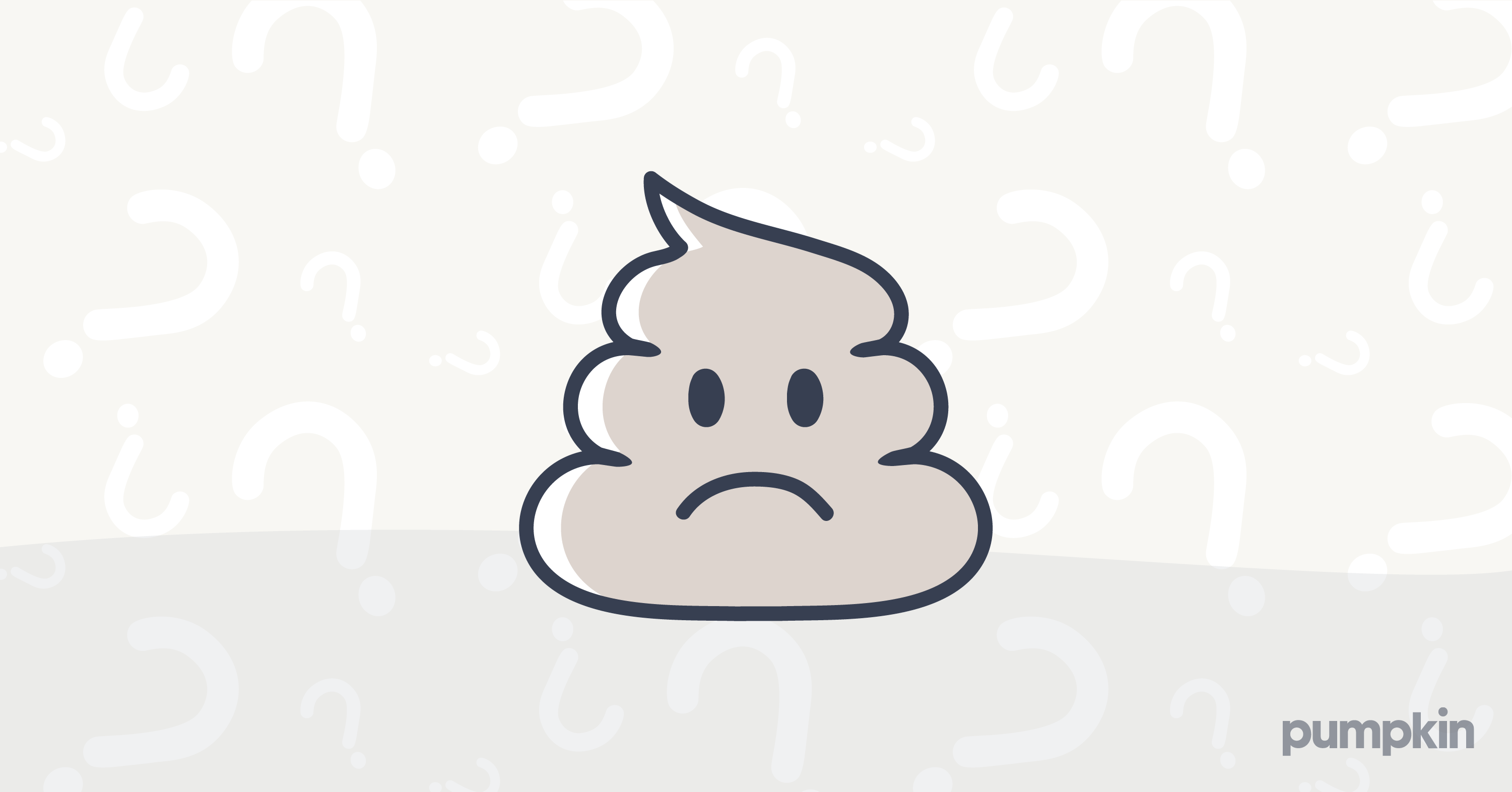Key Points:
- Grey dog poop is an indicator of undigested fat in the stool.
- Excess fat may be the one-off result of an extra fatty meal – or, in more serious cases, it could indicate a pancreatic issue.
- If your dog has recurring grey poop, make an appointment with your vet asap!
As seasoned dog owners know, dog poop color can tell you a lot about your dog’s health. It can be alarming to encounter a greasy, grey stool – and you may find yourself wondering: what could this possibly mean? Grey dog poop indicates excess fat in the stool. While a one-off grey poop is no cause for panic, recurring grey poop may be indicative of a deeper health problem.
Symptoms
A well-formed, not-too-soft yet not-too-hard chocolate brown mound is the gold standard in terms of doggy doo doo. However, a one-off grey poop, especially after a particularly fatty meal, is nothing to worry about. Recurring poop of a greasy, grey hue, on the other hand, may be cause for concern.
“Grey poop is often associated with problems digesting fat, a high-fatty acid, or bile problems,” says Dr. Sabrina Kong of WeLoveDoodles. “If your dog has recently eaten something very fatty, it’s not that big of a deal. However, if you are noticing grey poop for several days, it’s time to call your vet.”
Keep an eye out for these common symptoms that may accompany the grey poop:
- Chronic diarrhea or loose stools
- Steady weight loss over several weeks or months
- Excessive appetite
- Frequent upset stomach
- Occasional vomiting
These are all symptoms that indicate problems with your dog’s digestion. Schedule an appointment with your vet if you notice them.
Common causes of grey dog poop
As mentioned, grey, greasy dog stool is an indicator that your dog isn’t properly digesting fat. The exact cause, however, can vary. The cause of undigested fat may simply be a diet that includes a large amount of fatty foods, or it could be a pancreas or biliary problem.
Blocked bile duct
In some cases, grey poop is a sign of a blocked bile duct. Bile production is necessary for your dog’s digestion and immune system. If a duct is blocked, bile builds up in the liver, causing digestion to stop.
Pancreatitis
Usually, a blocked bile duct is the result of an inflamed pancreas or pancreatitis in dogs. The pancreas is a small organ located beneath your dog’s stomach, near their small intestine. In addition to regulating blood sugar by producing insulin, it also produces digestive enzymes that help your pup break down fat, protein, and starch.
Exocrine pancreatic insufficiency
Often, grey poop is a sign of another pancreatic issue: exocrine pancreatic insufficiency (EPI), commonly known as maldigestion. EPI is a condition in which the pancreas is unable to produce enough enzymes to digest fat. EPI is not curable but can be easily managed with supplements and changes to your dog’s diet.
“Exocrine pancreatic insufficiency is usually genetic but can also be caused by severe injury to the pancreas by diseases like pancreatitis,” says Dr. Ellen Russell of The Malamute Mom. “Dogs with pancreatic insufficiency usually have a ravenous appetite but appear underweight.”
Some breeds prone to developing genetic EPI include Chow Chows, German Shepherds, Rough-coated Collies, and Cavalier King Charles Spaniels.
Pro Tip: Sometimes poop shades that are similar in color can mean very different things. Is your dog’s poop less grey and greasy and more of a whitish hue? White dog poop, or white spots within poop – especially of a chalky consistency – are indicators of too much calcium in your dog’s system.
Diagnosis
If your dog’s grey poop is recurring, or the poop appears in conjunction with other symptoms, like diarrhea, the first step to diagnosing the cause is to schedule an appointment with your vet.
To diagnose your dog, your vet may:
- Review your dog’s medical history and ask you about any recent symptoms or unusual behavior.
- Do a physical examination of your dog.
- Perform a fecal examination.
- Check your dog’s pancreatic function by performing a canine trypsinogen-like immunoassay (cTLI) test. This is a blood test that requires fasting.
- In some cases, your vet may want to take a closer look at your dog’s pancreas through X-rays or ultrasounds.
Treatment
If the grey poop is determined to be a product of too much fatty food, your vet may recommend making dietary changes. In some cases, a prescription diet of low-fat or gastrointestinal-supporting foods may be prescribed.
Conditions like EPI are incurable but can be easily managed in the long-term. Similarly, there’s no quick cure for pancreatitis, but your vet may be able to ease pain by prescribing anti-nausea or pain management medications, or through fluid replacement therapy. Allow your dog plenty of time to rest and recover if they’re still experiencing symptoms.

Recovery and care
Whether your dog is diagnosed with EPI or an imbalance diet, your vet will work with you to create a long-term condition management plan. This will likely include low-fat, easily digestible dog food and a supplement to replace pancreatic enzymes (often in the form of a powder). In some cases, a vitamin B12 supplement will also be prescribed.
Prevention
If your dog eats a lot of fatty foods, consider adding more balance to their diet. If you aren’t sure which foods might be too much for your dog’s digestive system to handle, consult your vet. You can work with your vet to help determine the right foods to feed your dog. You’re aiming for balanced meals with plenty of healthy fats to promote good digestion.
If your dog’s grey poop is determined to be caused by EPI, it cannot be prevented, as EPI is typically a genetic condition or the result of a pancreas injury. Luckily, with quick intervention, EPI is not dangerous. If your dog is diagnosed with EPI, your vet will work with you to help manage your dog’s condition.
What to expect at the vet’s office
Before your dog’s appointment, your vet may instruct you to have your dog fast for several hours in preparation for the cTLI test. Once you’ve arrived, your vet will go over any symptoms you’ve noticed and will ask about your dog’s diet. Then, they’ll perform a physical exam, paying close attention to your dog’s gums and abdominal area. Your vet will likely draw a blood sample to check your dog’s pancreas function. Once they’ve diagnosed the cause of the grey poop, your vet will work with you to determine a treatment plan and will prescribe any necessary medications and supplements.
The bottom line
Grey dog poo means your dog has excess fat in their stool. This may be the result of a fatty diet or could indicate a deeper issue, such as a pancreatic condition called EPI. Luckily, EPI is not life-threatening if properly managed. Your vet will help you determine the cause of the grey color and devise a treatment plan.
Grey dog poop FAQs
Why does my dog have grey dog poop?
If your dog’s poop is grey and greasy, it means your dog is having trouble digesting fat. This may be a one-off occurrence after an especially fatty meal or could indicate a pancreatic problem.
Should I take my dog to the vet if they have grey dog poop?
Having grey poop one time is not a cause for concern. However, be sure to monitor your dog’s bowel movements over the next few days. If your dog continues to have greasy, grey poop, or the poop is accompanied by other symptoms, schedule an appointment with your vet.
How do you treat grey dog poop?
How you treat recurring grey poop depends on its cause. Your vet will diagnose the cause and prescribe a treatment plan, which may include a change in diet or additional supplements.
Does pet insurance cover grey dog poop?
Pet insurance helps pet owners cover their vet bills when unexpected accidents or illnesses arise. This could include diagnosing and treating underlying causes that result in a recurring case of grey dog poop.
What colors of dog poop are abnormal?
Healthy dog poop is a brown color. Black dog poop could be a sign of digested blood in the gastrointestinal tract. Red streaks tend to indicate bleeding in the gastrointestinal tract. Like grey poop, yellow dog poop may indicate problems with your pup’s liver, gallbladder, or pancreas. Green dog poop could be a sign of infection or simply a sign your dog ate too much grass. If you find white specks in your dog’s poop you may be dealing with parasites such as tapeworms in dogs. (Take a sample to your vet so they can prescribe a dewormer.)
Pumpkin Dog Insurance plans offer up to 90% cash back on eligible vet bills. Fetch a free quote today!
- https://www.petmd.com/dog/conditions/digestive/c_multi_exocrine_pancreatic_insufficiency
- https://veterinarypartner.vin.com/default.aspx?pid=19239&id=4952034
- https://www.akc.org/expert-advice/health/pancreatitis-in-dogs/



